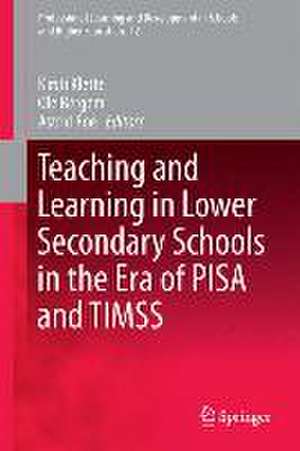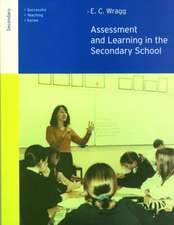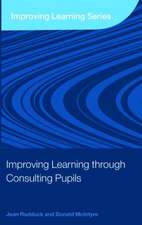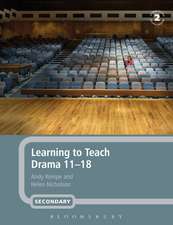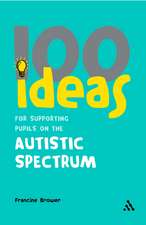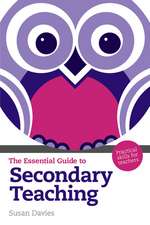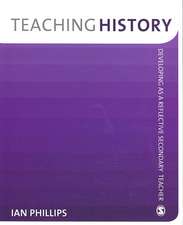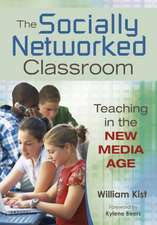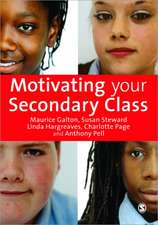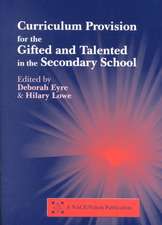Teaching and Learning in Lower Secondary Schools in the Era of PISA and TIMSS: Professional Learning and Development in Schools and Higher Education, cartea 12
Editat de Kirsti Klette, Ole K. Bergem, Astrid Roeen Limba Engleză Hardback – 13 aug 2015
| Toate formatele și edițiile | Preț | Express |
|---|---|---|
| Paperback (1) | 382.57 lei 6-8 săpt. | |
| Springer International Publishing – 22 oct 2016 | 382.57 lei 6-8 săpt. | |
| Hardback (1) | 389.88 lei 6-8 săpt. | |
| Springer International Publishing – 13 aug 2015 | 389.88 lei 6-8 săpt. |
Din seria Professional Learning and Development in Schools and Higher Education
- 15%
 Preț: 639.08 lei
Preț: 639.08 lei - 15%
 Preț: 633.19 lei
Preț: 633.19 lei - 15%
 Preț: 648.42 lei
Preț: 648.42 lei -
 Preț: 400.85 lei
Preț: 400.85 lei - 15%
 Preț: 649.06 lei
Preț: 649.06 lei -
 Preț: 388.90 lei
Preț: 388.90 lei - 15%
 Preț: 699.93 lei
Preț: 699.93 lei - 18%
 Preț: 887.38 lei
Preț: 887.38 lei - 15%
 Preț: 640.37 lei
Preț: 640.37 lei - 18%
 Preț: 887.38 lei
Preț: 887.38 lei - 15%
 Preț: 638.43 lei
Preț: 638.43 lei - 15%
 Preț: 634.00 lei
Preț: 634.00 lei - 15%
 Preț: 639.73 lei
Preț: 639.73 lei - 15%
 Preț: 643.48 lei
Preț: 643.48 lei - 20%
 Preț: 566.52 lei
Preț: 566.52 lei
Preț: 389.88 lei
Nou
Puncte Express: 585
Preț estimativ în valută:
74.61€ • 81.02$ • 62.67£
74.61€ • 81.02$ • 62.67£
Carte tipărită la comandă
Livrare economică 22 aprilie-06 mai
Preluare comenzi: 021 569.72.76
Specificații
ISBN-13: 9783319173016
ISBN-10: 3319173014
Pagini: 250
Ilustrații: VI, 193 p. 17 illus., 8 illus. in color.
Dimensiuni: 155 x 235 x 17 mm
Greutate: 0.46 kg
Ediția:1st ed. 2016
Editura: Springer International Publishing
Colecția Springer
Seria Professional Learning and Development in Schools and Higher Education
Locul publicării:Cham, Switzerland
ISBN-10: 3319173014
Pagini: 250
Ilustrații: VI, 193 p. 17 illus., 8 illus. in color.
Dimensiuni: 155 x 235 x 17 mm
Greutate: 0.46 kg
Ediția:1st ed. 2016
Editura: Springer International Publishing
Colecția Springer
Seria Professional Learning and Development in Schools and Higher Education
Locul publicării:Cham, Switzerland
Public țintă
ResearchCuprins
Introduction: Kirsti Klette: Studying interaction and instructional patterns in classrooms.- Part I Instruction matters.- Chapter 1: Kirsti Klette and Marianne Ødegaard: Instructional activities and discourse features in science classrooms: teachers talking and students listening or…?.- Chapter2: Øistein Anmarkrud: Inquisitor, evaluator or facilitator? Teachers’ use of instructional format during naturally occurring comprehension strategies instruction.- Chapter 3: Ole Kristian Bergem: “Usually we are not where the teacher is” Individualized teaching methods in mathematics classrooms.- Chapter 4: Emilia Anderson-Bakken and Kirsti Klette: Teachers’ use of questions and responses to students’ contributions during whole class discussions: comparing language arts and science classrooms.- Chapter5: Astrid Roe: Teachers' contribution to students reading engagement and reading strategies.- Part II Discourse matters.- Chapter 6: Marianne Ødegaard, Nina Arnesen and Kirsti Klette: Talk and use of language in the science classroom – characteristic features.- Chapter 7: Nina Arnesen: How students make meaning from a teaching sequence on a socio-scientific issue - a case study of meaning making in science.- Chapter 8: Ole Kristian Bergem and Kirsti Klette: Conversations as learning tools in mathematics: What do pupils actually learn?.- Part III Engagement matters.- Chapter 9: Ole Kristian Bergem: “I prefer to take one subject a day” Students’ working strategies during independent teaching sessions.- Chapter 10: Ole Kristian Bergem:“Mathematics is my favorite subject!” Variation in instructional practices boosting students’ attitudes towards mathematics.- Chapter11: Marianne Ødegaard: Teacher commitments - love and duty in science education.
Textul de pe ultima copertă
Based on extensive video documentation from science, math and reading classrooms in Norwegian secondary schooling, this book explores teaching and learning in lower secondary classrooms in the three PISA domains science, mathematics and reading. It analyzes how offered and experienced teaching and learning opportunities in these three subject areas support students’ learning. The in-depth investigations of video documentation are combined with analysis of data from PISA and TIMSS in order to understand how teaching and learning in science, mathematics and reading can be improved. Recent reviews indicate that instructional practice does make a difference to students learning - and is more important than other factors including students’ socioeconomic background, class size, classroom climate, and teachers’ experience and formal training. This book opens the discussion on a European basis about contemporary challenges in teaching and learning in secondary schooling. Norway as a test bed is particularly interesting due to its long tradition with national curricula, and its unitary and non- streamed structure. Furthermore, ideas of educational progressivism and students’ active ways of working (such as individualized teaching, adapted teaching, inquiry based teaching etc.) have for a long time been actively promoted within Norwegian educational policies. The book draws on analyses that combine expertise in psychometrics and video-based micro genetic classroom studies with expertise in domain-specific instruction (math, science and reading). It feeds the conversation how issues of communication patterns are dealt with and made productive within different instructional formats, and presents possibilities to compare and analyze instructional formats and discursive practices for students’ learning.
Caracteristici
Combines quantitative and qualitative analyses from studies of lower secundary schooling Provides unprecented insight of what goes on in classrooms through analyses from video documentation from classrooms Links instructional patterns with discursive features of teacher-student interaction
